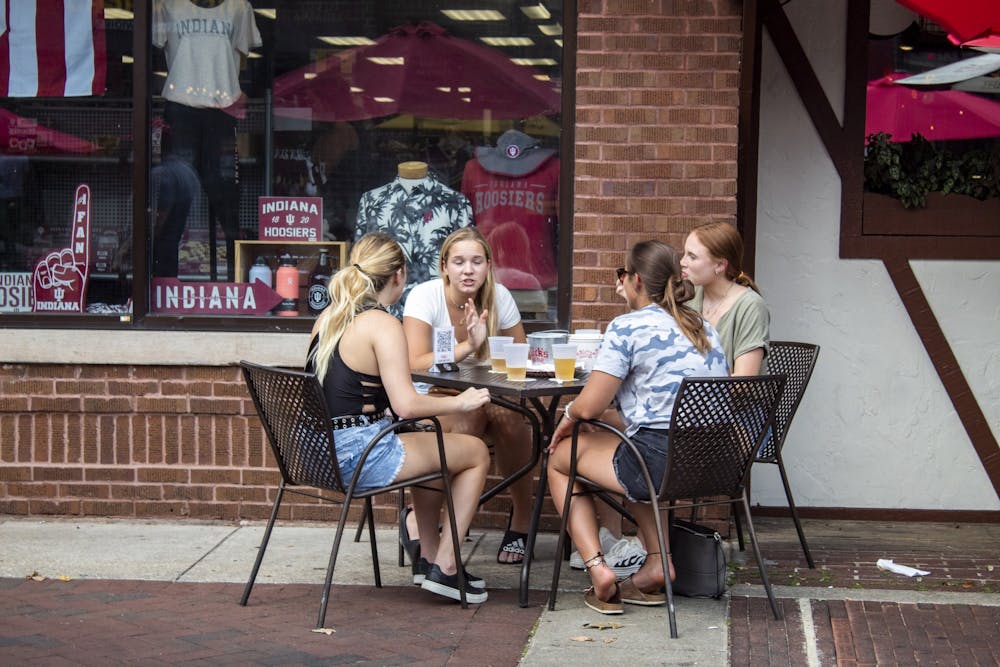Kirkwood Avenue, the epicenter of IU’s off-campus student life, has been closed to cars from Thursday to Sunday since June, and the Bloomington City Council recently voted to continue these closures through December. Closing Kirkwood to cars on the weekends to make space for expanded outdoor dining has made the street more pedestrian-friendly, conducive to social distancing requirements, economically vibrant and environmentally sustainable.
Reopening Kirkwood on weekdays does away with the safer and more pleasant Kirkwood that Bloomington residents get to experience on the weekends. Bloomington should keep Kirkwood closed to cars to preserve the safest, healthiest and most environmentally friendly Kirkwood possible. Other cities have repeatedly demonstrated the myriad economic, environmental and health benefits of car-free streets. All Bloomington has to do is make these already popular changes permanent.
The most pertinent benefit of Kirkwood’s closures on the weekend is that it allows pedestrians and outdoor diners to maintain a greater social distance, keeping Bloomington safe and decreasing the risk of the spread of COVID-19. Reopening Kirkwood to cars pushes pedestrians to crowd together on sidewalks, and the lack of outdoor seating on weekdays forces diners indoors. Eating inside restaurants has been repeatedly demonstrated to be one of the most dangerous activities someone can do during the pandemic.
Closing Kirkwood to cars permanently would allow Bloomington to join the growing cohort of cities embracing car-free streets as a way to make their streets safer, more accessible and more environmentally friendly. Even megacities like New York have closed streets to decrease congestion, promote pedestrian safety and reinvigorate modes of public transportation.
The case of 14th Street, which is now a vibrant hub of pedestrian life, provides a valuable example in the quest to make our cities less transportation-heavy. What used to be another congested street in New York City is now known as a “speedway” for buses and pedestrians, improving Manhattan’s public transportation and pedestrian safety.
Instead of disrupting traffic, the street’s closure has caused an increase in bus ridership, a decrease in travel times and has made buses more likely to be on time. Since fewer vehicles are present, the street is now a safer environment for pedestrians. Although some car owners are quick to complain about increased congestion in the city, adjacent streets are no more congested now than they were in years past.
As a result of New York City’s bold decision, Manhattan is now more accessible to the majority of residents that do not own a car and is more environmentally sustainable. The conversion of 14th Street from a gridlock of cars to a thriving hub of pedestrians, cyclists and public transportation has made residents happier, according to a Bloomberg article from 2019.
The success in New York City convinced San Francisco residents that Market Street, one of their busiest hubs, should be more pedestrian-friendly. Just a few months after Market Street closed to cars, ridership on public transportation increased by 24% on weekdays and 30% on the weekends. Bus trips were 10 minutes shorter on average than before the street’s closure.
Promoting public transportation, as New York City and San Francisco have done, is one of the most effective ways cities can promote sustainability. Carrying many passengers on a single vehicle — as public buses and trains do — reduces tailpipe emissions and helps passengers lower their individual carbon footprints. This will also decrease smog and improve local air quality.
Citing economic and sustainability benefits, fellow college towns like Charlottesville, Virginia, and Boulder, Colorado, have copied this move. Charlottesville’s downtown is now centered on eight blocks of car-free streets, which draws more pedestrians to local stores, restaurants and bars.
Pearl Street, Kirkwood's equivalent at the University of Colorado Boulder, has been closed to cars since the 1970s. Rather than depriving local businesses, the street’s closure brought Boulder back from an economic brink. The street has turned into the cultural center of the city.
Keeping Kirkwood a pedestrian-friendly street all the time will make Bloomington a more enjoyable place to live — one that prioritizes residents and their health, economic resilience and the local environment over cars, traffic and congestion. Long after the pandemic is over, the sustainability and economic benefits of keeping Kirkwood a pedestrian and public transportation hub will persist.
Bloomington has a choice to make: We can continue to be on the forefront of urban design and expand this bold, progressive policy, or we can say goodbye to the more sustainable, safe Kirkwood that so many of us have come to love over these past few months. The city council has already extended the closures through December. The right choice is to make the policy permanent.
Sarah Waters (she/her) is a freshman pre-law student studying law and public policy. She is involved with College Democrats at IU and the Hutton Honors Council Association.






